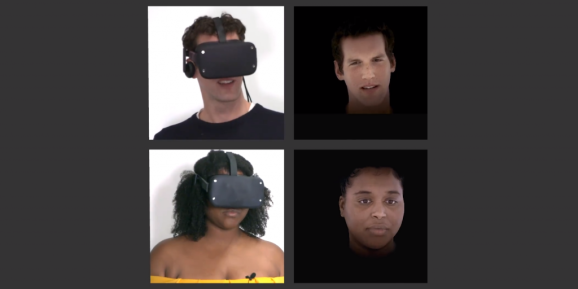Facebook Working on Fully Tracked Full-Body Virtual Reality Avatars
VR Avatars to get more realistic in the future
Facebook is currently in the process of developing full-body virtual reality avatars that will be as expressive as real humans. That means they will also look and move just like real people do. Facebook is working on this initiative in order to create futuristic virtual reality experiences that will be more immersive and more engaging.

To this end, Facebook is currently in the process of creating and animating anatomically accurate models of human skeletons and then layering muscle detection and skin over these models. The company is also working on capturing the non-verbal cues like the victory dances people usually perform when they score a point in a sports game.
This was revealed during Facebook’s F8 Developer Conference 2019 which was held this Wednesday. The company is currently in the process of tracking how human beings move in real time and then replicating these movements in virtual reality. Facebook is also involved in the reconstruction and simulation of the actual clothing worn by a person and using physics-based software to understand how the clothing should be moving in virtual reality when a person does actions such as stretching or dancing. By going to these very minute details of simulation, Facebook hopes to create hyper-realistic virtual avatars that will closely mimic the actions of real humans.
Facebook is deploying fairly simple sensors on its Oculus virtual reality headsets to capture the facial expressions on the users’ faces and then translates these expressions into movements for the virtual faces that users will interact with in VR.
However, in spite of the effort and investment, it is still a long way before Facebook is able to produce realistic avatars. They have admitted as much. There is also the need to work further on creating a safer shared social environment for these experiences. During a keynote speech at the F8, Facebook showcased what it’s working on in this new innovative frontier where it is developing virtual reality and augmented reality avatars that will be more expressive.
The sensors may be relatively basic and are not as accurate in capturing these movements but Facebook Reality Labs is using them to train artificial intelligence models of the future. The company finds it more convenient to use simple sensors that will not be burdensome, like most of the current motion-capture devices, and which will not end up weighing down the mocap actors. With the current state of technologies, mocap procedures will take the teams of specialists months to accomplish and it helps to have simple and light motion capture equipment that will not be too daunting for the specialists and actors.
Eventually, this technology will have to be automated and it will have to function with the off-the-shelf sensors.
For consumer-facing uses of the future, the technology for generating realistic avatars must also be secured and authenticated through techniques such as facial and fingerprint recognition to prevent other people from stealing personal avatars and putting them into other unethical or even criminal uses such as impersonation or identify theft. It will also need to function elegantly with all types of skin types, body types, hair and genders. By then, hopefully, the technology will be out of the Facebook Reality Labs and will have been compressed into a compact and elegant application or software that is easily deployable across multiple virtual reality portals.
Facebook Reality Labs uses a Portal social camera to automatically focus on people inside a room with help of artificial intelligence. Using AI, the camera was trained to recognize all kinds people and focus on them when they are performing an action such as speaking or moving. Facebook is tapping into virtual reality’s next frontier which will be human interaction.
The Facebook technology is aimed at overcoming the limitation of the current avatars. A current virtual persona mainly consists of the head and in some cases hands. These are the only parts whose motion can be successfully tracked using the current consumer virtual reality headsets and controllers. Even on Facebook’s most recent virtual reality headset, the Oculus Quest, you are only able to control the hands and the head. There are customization options such those in the Oculus apps but all they accomplish is generating a cartoon version of you or creating a fantasy out of your animated persona.
During the F8 conference, Oculus showcased a video demo of the latest prototype of its next-generation hyper-realistic virtual reality avatars. The video showed fully-tracked full-body avatars where a man and a woman moved around a room wearing virtual reality headsets while near-identical virtual avatars of them simultaneously played soccer on a virtual field using a digital soccer ball. When the man and the woman raised their hands or kicked their legs about, their virtual avatars also did the same with only a slight lag in the virtual version. The animated faces in virtual avatars looked almost human. Facebook hopes to create such three-dimensional and realistic-looking avatar faces that will be capable of matching real human motions and expressions in real-time. The next logical step would be to track the rest of the body.
As promising as it is, generating this kind of fully-tracked and full-body avatar will take years before the technology is available on virtual reality headsets. There is just isn’t the technological sophistication to support this and the current off-the shelf sensors are incapable of generating these digital versions of people.
https://virtualrealitytimes.com/2019/05/02/facebook-working-on-fully-tracked-full-body-virtual-reality-avatars/https://virtualrealitytimes.com/wp-content/uploads/2019/03/Facebook-Codec-Avatars-600x316.jpghttps://virtualrealitytimes.com/wp-content/uploads/2019/03/Facebook-Codec-Avatars-150x90.jpgInventionsVR Avatars to get more realistic in the future Facebook is currently in the process of developing full-body virtual reality avatars that will be as expressive as real humans. That means they will also look and move just like real people do. Facebook is working on this initiative in order...Sam OchanjiSam Ochanji[email protected]EditorVirtual Reality Times - Metaverse & VR
